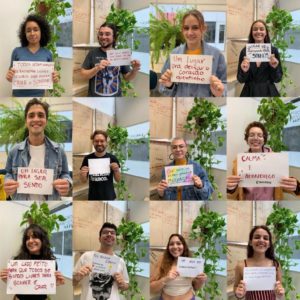Critical pedagogy
-
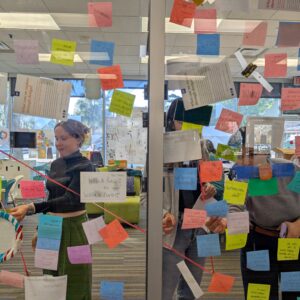
Spring 2025 (Design) Research and Practice
Research and Practice is a 45-hour course at the University of Florida that immerses Design and Visual Communications (MXD) graduate students in the practice of doing design research. The Spring 2025 cohort experienced a full-blown self-managed studio, meaning students managed their studio learning experience with instructor guidance. The instructor played the facilitator and, eventually, the complicator role. […] - Jun 6, 2025 -
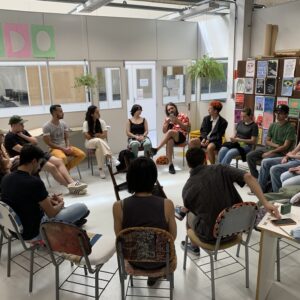 Abstract: Imagine a design studio where aspiring designers break free from traditional hierarchies and redefine what it means to be a designer. In the self-managed studio developed at UTFPR, design students learned that design can serve not just industries but social movements and the public. Inspired by critical pedagogy and radical practices like Theater of the Oppressed, […] - Jan 18, 2025
Abstract: Imagine a design studio where aspiring designers break free from traditional hierarchies and redefine what it means to be a designer. In the self-managed studio developed at UTFPR, design students learned that design can serve not just industries but social movements and the public. Inspired by critical pedagogy and radical practices like Theater of the Oppressed, […] - Jan 18, 2025 -
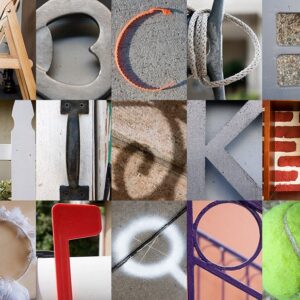
Design + Identity in Everyday Life
Quest 1 course (open to all majors), School of Art + Art History, University of Florida, 45 hours, Spring 2025 This course asks: How does design work as a tool for shaping, understanding, and communicating identity—“the fact of being who or what a person is”—in everyday life? Designed environments, objects, and interfaces allow us to shape the […] - Jan 6, 2025 -
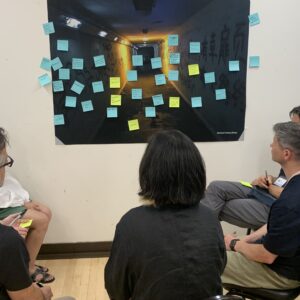 Culture circles is a participatory educational method developed by Paulo Freire to foster literacy and critical consciousness through dialogue. It emphasizes horizontal, dialogical learning, where participants and facilitators engage as equals in analyzing their lived experiences and co-creating knowledge. The term “circle” underscores this horizontal structure, symbolizing equality among participants and rejecting the top-down dynamics […] - Dec 8, 2024
Culture circles is a participatory educational method developed by Paulo Freire to foster literacy and critical consciousness through dialogue. It emphasizes horizontal, dialogical learning, where participants and facilitators engage as equals in analyzing their lived experiences and co-creating knowledge. The term “circle” underscores this horizontal structure, symbolizing equality among participants and rejecting the top-down dynamics […] - Dec 8, 2024 -
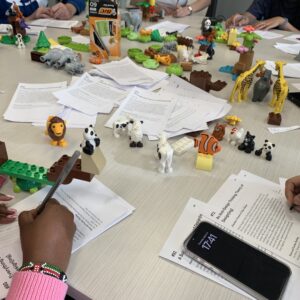 Graduate Seminar (Spring 2024) is a 45-hour course at the University of Florida that prepares Design and Visual Communications (MXD) graduate students to critically engage with contemporary design research methodologies. The seminar is organized as an expansive learning journey that begins with the barebones of becoming a design researcher and ends with joining a design research community. The […] - Dec 3, 2024
Graduate Seminar (Spring 2024) is a 45-hour course at the University of Florida that prepares Design and Visual Communications (MXD) graduate students to critically engage with contemporary design research methodologies. The seminar is organized as an expansive learning journey that begins with the barebones of becoming a design researcher and ends with joining a design research community. The […] - Dec 3, 2024 -
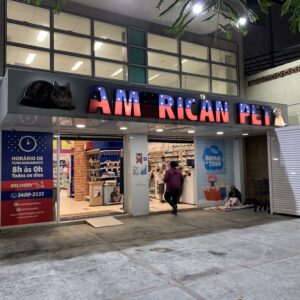
Social Design at the Brink: Hopes and Fears
Fonseca Braga, M., M. C. van Amstel, F., and Perez, D. (2024) Social Design at the Brink: Hopes and Fears., in Gray, C., Hekkert, P ., Forlano, L., Ciuccarelli, P . (eds.), DRS2024: Boston, 23–28 June, Boston, USA. https://doi.org/10.21606/drs.2024.1538 - Oct 26, 2024 -
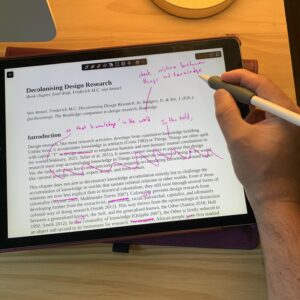
Tips and tricks for writing design research
Why are design researchers not so excited about reading and writing if that is an integral aspect of doing design research? In my view, designers are typically exploited in so miany ways, primarily for cheap labor. They are not expected to say anything, just give form to previously defined functions and content. In a critical […] - Sep 23, 2024 -

Reading the world with Lego Serious Play
Abstract: “Reading the world precedes reading the word,” says Paulo Freire, the Brazilian educator who revolutionized adult education. Instead of requiring students to read words without understanding their meanings, his educational approach, critical pedagogy, begins with reading the world through generative images that depict everyday scenes. Lego Serious Play can play a similar role in […] - Aug 28, 2024 -
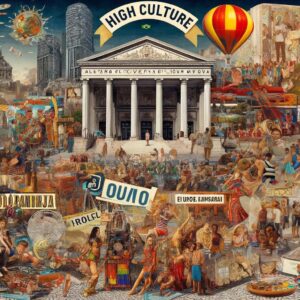 Some months ago, I joined Lee Moreau, Lesley-Ann Noel, and Alicia Cheng in the inaugural episodes of the Design As podcast (Apple/Spotify), connected to the Design Observer project. We discussed Design as Culture. The conversation was so rich and dense that we split it into two parts. Luckily, Design Observer published a transcript for those […] - Jun 1, 2024
Some months ago, I joined Lee Moreau, Lesley-Ann Noel, and Alicia Cheng in the inaugural episodes of the Design As podcast (Apple/Spotify), connected to the Design Observer project. We discussed Design as Culture. The conversation was so rich and dense that we split it into two parts. Luckily, Design Observer published a transcript for those […] - Jun 1, 2024 -
 From the outset of their design education at UTFPR, Alanis Louise de Mello Zukowski and Maria Vitória Ribeiro Kosake were struck by a disconnect between their aspirations and the education they received. The design curriculum seemed narrowly focused on technical skills and market demands, leaving little room for critical reflection or social engagement. As they […] - May 9, 2024
From the outset of their design education at UTFPR, Alanis Louise de Mello Zukowski and Maria Vitória Ribeiro Kosake were struck by a disconnect between their aspirations and the education they received. The design curriculum seemed narrowly focused on technical skills and market demands, leaving little room for critical reflection or social engagement. As they […] - May 9, 2024 -
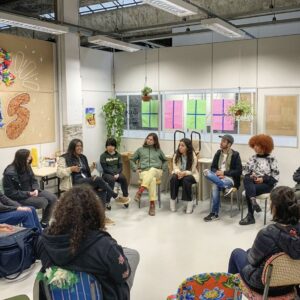
Learning design as a human right: the beginnings of a design lab founded on critical pedagogy
Bizotto dos Santos, W.B., Mazzarotto, M.,and Van Amstel, F. (2023). Learning design as a human right: the beginnings of a design lab founded on critical pedagogy, in Derek Jones, Naz Borekci, Violeta Clemente, James Corazzo, Nicole Lotz, Liv Merete Nielsen, Lesley-Ann Noel (eds.), The 7th International Conference for Design Education Researchers, 29 November – 1 December […] - Mar 18, 2024 -
 Udoewa, V., Gutiérrez Borrero, A., Noel, L., Ruiz, A., Borchway, N.K., Lodaya, A.,and VAN AMSTEL, F.M.(2023) When Is the Pluriverse?, in Derek Jones, Naz Borekci, Violeta Clemente, James Corazzo, Nicole Lotz, Liv Merete Nielsen, Lesley-Ann Noel (eds.), The 7th International Conference for Design Education Researchers, 29 November – 1 December 2023, London, United Kingdom. https://doi.org/10.21606/drslxd.2023.109 - Mar 14, 2024
Udoewa, V., Gutiérrez Borrero, A., Noel, L., Ruiz, A., Borchway, N.K., Lodaya, A.,and VAN AMSTEL, F.M.(2023) When Is the Pluriverse?, in Derek Jones, Naz Borekci, Violeta Clemente, James Corazzo, Nicole Lotz, Liv Merete Nielsen, Lesley-Ann Noel (eds.), The 7th International Conference for Design Education Researchers, 29 November – 1 December 2023, London, United Kingdom. https://doi.org/10.21606/drslxd.2023.109 - Mar 14, 2024 -
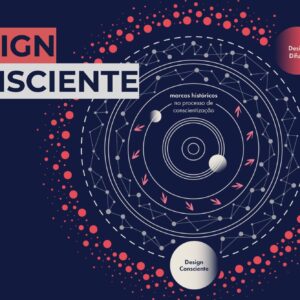
Conscious design for a women shelter (2023)
Camila Kutiski heard from a friend about a shelter service for victims of domestic violence in her neighborhood. She visited the non-profit running the service and decided to support the people involved with her Graphic Design final work at UTFPR. The first thing she did was to understand the existing design activities in the non-profit. […] - Feb 24, 2024 -

Prospecting anti-colonial qualities in Design Education
Mazzarotto. M., Van Amstel. F. M. C., Serpa, B. O., Silva, S. B. (2023). Prospecting anti-colonial qualities in Design Education. V!RUS Journal, 26, 135-143. Translated from Portuguese by Giovana Blitzkow Scucato dos Santos. Available at: http://vnomads.eastus.cloudapp.azure.com/ojs/index.php/virus/article/view/833 - Dec 26, 2023 -

Pluriversal Futures for Design Education
Noel, L.-A., Ruiz, A., van Amstel, F. M. C., Udoewa, V., Verma, N., Botchway, N. K., Lodaya, A., & Agrawal, S. (2023). Pluriversal Futures for Design Education. She Ji: The Journal of Design, Economics, and Innovation (Vol. 9, Issue 2, pp. 179–196). https://doi.org/10.1016/j.sheji.2023.04.002 - Sep 3, 2023 -

Humanity is not a (shopping) center you can design for
Donald Norman is about to release a book on Humanity-Centered Design. I don’t plan to buy or read it, but I can’t ignore it. As I previously wrote, shifting what is at the center of design does little to reconfigure the contradictions cultivated by centralization, which is a core spatial practice of patriarchy, capitalism, and […] - Oct 23, 2022 -
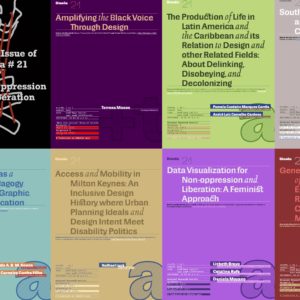
Design, Oppression, and Liberation
Van Amstel, F. M. C, Noel, L.-A., & Gonzatto, R. F. (2022). Design, Oppression, and Liberation. Diseña, (21), Intro. https://doi.org/10.7764/disena.21.Intro - Sep 13, 2022 -
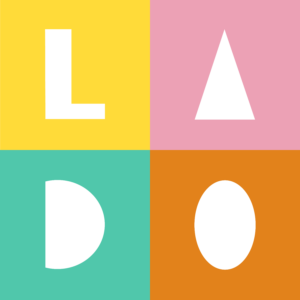
Laboratory of Design against Oppression (LADO)
The Laboratory of Design Against Oppressions (LADO) is an open, horizontal space for critical education, scientific research, and transformative action at UTFPR. Attentive to the objectives of student involvement and participation in university outreach, LADO is organized through self-management, including collective decision-making and distribution of power among the several working groups created to coordinate each of […] - Aug 11, 2022 -
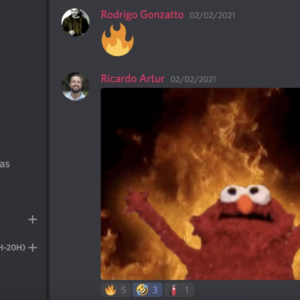
Weaving design as a practice of freedom: Critical pedagogy in an insurgent network
Serpa, B.O., van Amstel, F.M., Mazzarotto, M., Carvalho, R.A., Gonzatto, R.F., Batista e Silva, S., and da Silva Menezes, Y. (2022) Weaving design as a practice of freedom: Critical pedagogy in an insurgent network, in Lockton, D., Lenzi, S., Hekkert, P., Oak, A., Sádaba, J., Lloyd, P. (eds.), DRS2022: Bilbao, 25 June – 3 July, Bilbao, […] - Jun 21, 2022 -
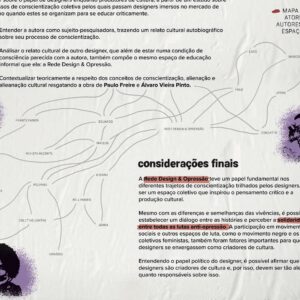
Designers as cultural producers (2022)
Polyana de Andrade Tavares, a graphic design student at LADO, embarked on a profound journey of collective conscientization that transformed her understanding of her role as a cultural producer. Her final work reflects on this transformative process through an autoethnographic lens, weaving together personal experiences and broader socio-cultural contexts. Initially, Polyana approached her study with […] - Jun 1, 2022 -
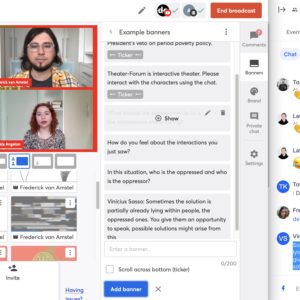 Forum Theater provides a forum to test and rehearse actions and responses to oppressive situations in the form of an interactive play. What differentiates Forum Theatre from other interactive theatre techniques is precisely its political goal of human and social emancipation. By stimulating the spectator’s effective intervention, Forum Theatre seeks to provoke reflections about the forms of […] - Apr 17, 2022
Forum Theater provides a forum to test and rehearse actions and responses to oppressive situations in the form of an interactive play. What differentiates Forum Theatre from other interactive theatre techniques is precisely its political goal of human and social emancipation. By stimulating the spectator’s effective intervention, Forum Theatre seeks to provoke reflections about the forms of […] - Apr 17, 2022 -
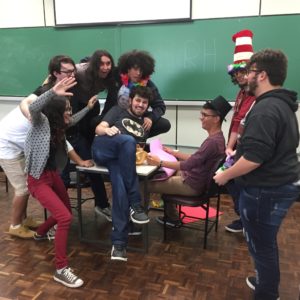
Design pedagogy, the body, and solidarity in designing commons
Podcast interview for the Commoning Design & Designing Commons show, an initiative from the Interest Group Commons and Commoning of the IT University of Copenhagen. Listen to the podcast on Anchor. Transcript Speaker Key – GP Giacomo Poderi; FA Frederick van Amstel; SM Sanna-Maria Marttila; JS Joanna Saad-Sulonen Speaker Text GP Okay, welcome to this first […] - Apr 12, 2022 -
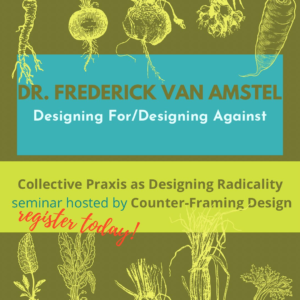
Designing For / Designing Against
Abstract: Most design theories and design methods are crafted to support the current hegemonies in society. While trying to sustain these hegemonies, designers eventually realize they are unsustainable, unfair, or dehumanizing. Among them, designers who develop a bit of critical consciousness rightly feel the need to shift from designing for to designing against hegemonies. More […] - Dec 10, 2021 -

Technology-Mediated Oppression
Summary: Can technology oppress or liberate people? This lecture introduces the Philosophy of Technology of Álvaro Vieira Pinto in dealing with this question. Vieira Pinto wrote extensively about cybernetics, artificial intelligence, transhumanism, and virtual reality’s role in mediating race, class, and colonial oppression, anticipating in the 1970s what STS scholars in other countries did in […] - Nov 3, 2021 -
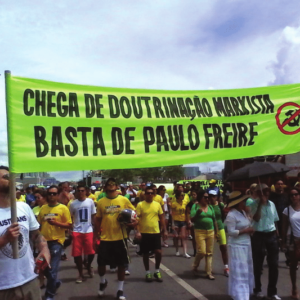 Abstract: This talk introduces the activity of Design & Oppression, woven by design professors, students, and professionals from all over Brazil from the perspective of one of its cofounders. The network discussed and experimented with several ways of recognizing how design reproduces oppression in our society. As of late 2021, the network is interested in […] - Oct 29, 2021
Abstract: This talk introduces the activity of Design & Oppression, woven by design professors, students, and professionals from all over Brazil from the perspective of one of its cofounders. The network discussed and experimented with several ways of recognizing how design reproduces oppression in our society. As of late 2021, the network is interested in […] - Oct 29, 2021 -
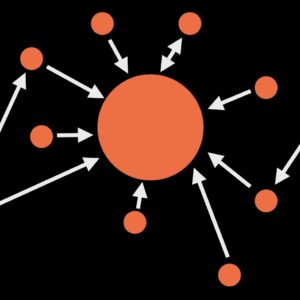
Relational design and the contradiction of oppression
Una charla en la sesión 8 de la Cátedra Diseño, Arte y Ciencia acogida pela Facultades de Artes y Diseño y de Ciencias Naturales e Ingeniería de la Universidad Jorge Tadeo Lozano (Colombia). Abstracto: El Diseño Relacional es una transformación profunda en la teoria y practica del diseño, en que se pierde el objeto para […] - Sep 21, 2021 -
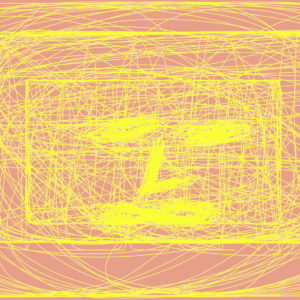 Designs of the Oppressed was a free online course offered by UTFPR, in partnership with the Design & Oppression network in 2021 and 2022, as part of larger efforts to strengthen Brazilian universities’ international reach. In it, several members of the network presented their work and promoted dialogues. The course shares the accumulated experience of […] - Aug 26, 2021
Designs of the Oppressed was a free online course offered by UTFPR, in partnership with the Design & Oppression network in 2021 and 2022, as part of larger efforts to strengthen Brazilian universities’ international reach. In it, several members of the network presented their work and promoted dialogues. The course shares the accumulated experience of […] - Aug 26, 2021 -
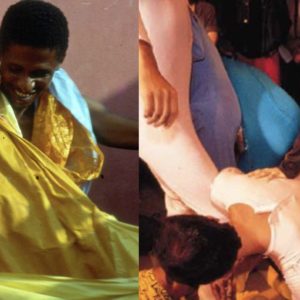
Domesticated futures and monster aesthetics
So far, design has contributed mostly to domesticate futures for the colonized. Nevertheless, design can also serve decolonizing practices that bring back the contradictory nature of human futures. The domestication of the future is a colonialist strategy that reduces existential time to a desirable space of possibilities that can be designed, packaged, and sold to […] - May 18, 2021 -
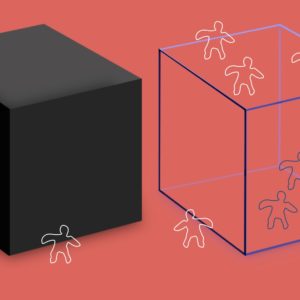 As institutions or individuals, design bodies have been weaponized for war, colonization, racism, sexism, ableism, and other forms of oppression. This talk reports on the Designing for Liberation research program that, since 2010, engages diverse design bodies with the fight against all forms of oppression. This program unleashes designing potentials that have been prevented or […] - Apr 8, 2021
As institutions or individuals, design bodies have been weaponized for war, colonization, racism, sexism, ableism, and other forms of oppression. This talk reports on the Designing for Liberation research program that, since 2010, engages diverse design bodies with the fight against all forms of oppression. This program unleashes designing potentials that have been prevented or […] - Apr 8, 2021 -
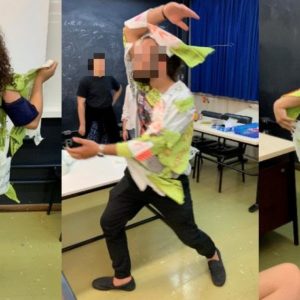
The political body as a fulcrum for radical imagination in metadesign
Angelon, Rafaela; Van Amstel, Frederick M.C. (2020). The political body as a fulcrum for radical imagination in metadesign. In: Proceedings of the III Design Culture Symposium, Unisinos, Porto Alegre, Brasil. - Nov 9, 2020 -
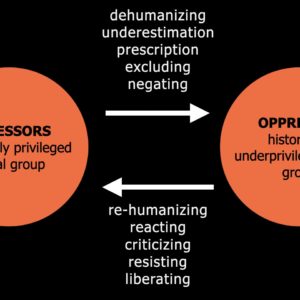
A Visual Summary of Pedagogy of the Oppressed (1970)
This is a book summary for the Pluriversal Design Book Club. It is a short contextualized introduction to Paulo Freire’s magnum opus. The main feature of this introduction is a visual scheme to frame the historical-dialectical relationships developed throughout the book: oppression, banking education, and colonization. This scheme also considers the emergence of third forces […] - Oct 30, 2020 -
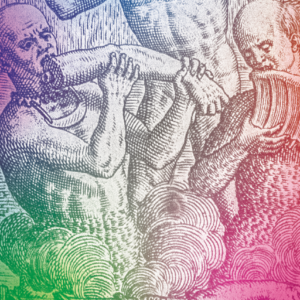
The Anthropophagic Studio: Towards a Critical Pedagogy for Interaction Design
Van Amstel, Frederick M.C and Gonzatto, Rodrigo Freese. (2020) The Anthropophagic Studio: Towards a Critical Pedagogy for Interaction Design. Digital Creativity, 31(4), p. 259-283. DOI: https://doi.org/10.1080/14626268.2020.1802295 - Jul 25, 2020 -
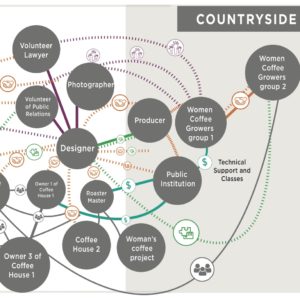
Matters of Care in Designing a Feminist Coalition
Eleutério, Rafaella P. and Van Amstel, Frederick M.C. Matters of Care in Designing a Feminist Coalition. (2020). In: Proceedings of the 16th Participatory Design Conference. Manizales, Colombia. DOI: https://doi.org/10.1145/3384772.3385157 - Jun 13, 2020 -
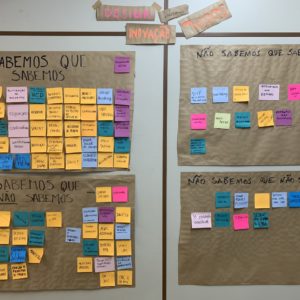
Course design and design (in)discipline
Course design and design (in)discipline (2020) was a talk given at the Innovative practices in higher education panel from UTFPR teaching seminars. UTFPR has been conducting debates and workshops on Course Design, a pedagogical approach that aims to promote innovation in education. Despite borrowing the term Design, this loan does not reach cutting-edge research in […] - Apr 27, 2020 -
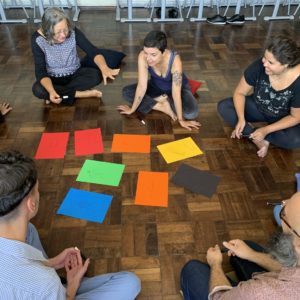 Thinking with the whole body (2020) was a workshop offered in UTFPR teaching seminars. The Technological University usually stimulates its students to think primarily with the brain, ignoring the biological and social support of this organ. Physical activity is restricted to complementary activities, which are isolated from the primary processes of learning, assessment, and knowledge […] - Apr 27, 2020
Thinking with the whole body (2020) was a workshop offered in UTFPR teaching seminars. The Technological University usually stimulates its students to think primarily with the brain, ignoring the biological and social support of this organ. Physical activity is restricted to complementary activities, which are isolated from the primary processes of learning, assessment, and knowledge […] - Apr 27, 2020 -

When black people move, all the possibilities of future move with them
Silva, R. L. P. da, Santos, M. R. dos, & Amstel, F. V. (2020). Quando o negro se movimenta, toda a possibilidade de futuro com ele se move (When the black’s people moves, all possibility of future with him moves). Albuquerque: Journal of History, 11(21), 132-150. https://doi.org/10.46401/ajh.2019.v11.9589 - Apr 15, 2020 -
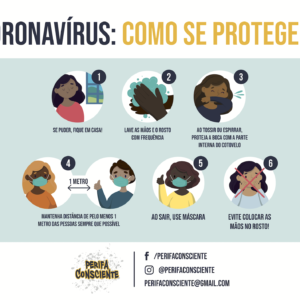
Conscious Periphery COVID-19 communication (2020)
Conscious Periphery is an emergency outreach activity funded by UTFPR to fight misinformation about the COVID-19 in vulnerable communities around the university. To reach this aim, the students involved in the activity will collaborate with community leaders to find the right tune as well as with healthcare professionals to deliver the correct information. The messages […] - Apr 9, 2020 -
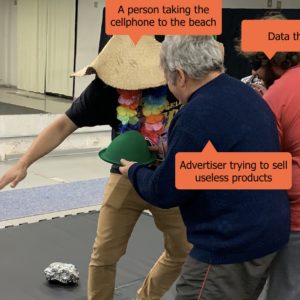
Theater of the Techno-Oppressed
Despite all the hype and hope around it, technology is not inherently good. Historically, technology has often intensified oppressions such as xenophobia, sexism, and racism. Social movements, activist groups, and oppressed people need to be aware of how technology does that and, especially, how it uncovers that under the pretext of neutrality. Theater of the […] - Apr 6, 2020 -
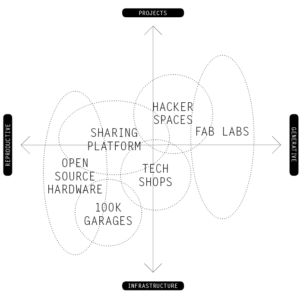 Open Design was initially introduced as an analog to Open Source Software, a concept which explains why software source code should be part of an official product release. The analogy went by stating that electronic drawings and models be released together with physical products, in the hopes of enabling modifications or self-production through digital fabrication. […] - Apr 6, 2020
Open Design was initially introduced as an analog to Open Source Software, a concept which explains why software source code should be part of an official product release. The analogy went by stating that electronic drawings and models be released together with physical products, in the hopes of enabling modifications or self-production through digital fabrication. […] - Apr 6, 2020 -
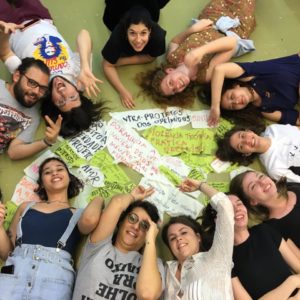
Design for People: Laboratory of Design and Social Innovation
60 hours – Bachelor in Design – UTFPR This studio course lets students discuss and realize the role of design in increasing or decreasing social inequalities. To realize that, they must develop a design project together with a disenfranchised community. Before joining a community, however, they must learn how to design together. Hence, the course […] - Mar 23, 2020 -
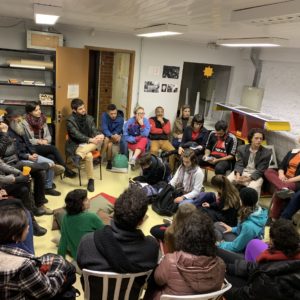 TECSOL is UTFPR’s Solidarity Economy Incubator. This outreach project assists disenfranchised communities to organize solidarity work relations, fair trade markets, and public policy advocacy for Solidarity Economy. Solidarity Economy is understood as an alternative mode of production which can work within Capitalism to overcome its limitations, such as poverty and dehumanization. I helped the incubator […] - Jul 8, 2019
TECSOL is UTFPR’s Solidarity Economy Incubator. This outreach project assists disenfranchised communities to organize solidarity work relations, fair trade markets, and public policy advocacy for Solidarity Economy. Solidarity Economy is understood as an alternative mode of production which can work within Capitalism to overcome its limitations, such as poverty and dehumanization. I helped the incubator […] - Jul 8, 2019 -
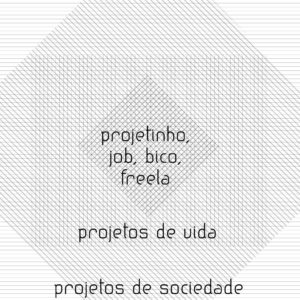 Design is often defined as a professional activity that produces physical and symbolic artifacts. However, in contemporary common parlance, the design word is also used to describe the characteristics of this professional activity’s products. Despite professionals claiming responsibility for these qualities, there is ample evidence that such qualities are not defined solely by professionals. Instead, […] - Oct 31, 2018
Design is often defined as a professional activity that produces physical and symbolic artifacts. However, in contemporary common parlance, the design word is also used to describe the characteristics of this professional activity’s products. Despite professionals claiming responsibility for these qualities, there is ample evidence that such qualities are not defined solely by professionals. Instead, […] - Oct 31, 2018 -
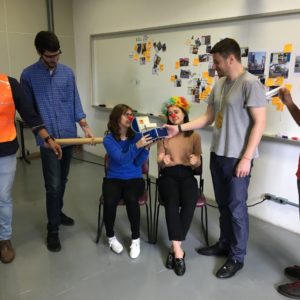 Cities and Technologies is a 30 hours graduate course from the Urban Management program from PUCPR. The course was delivered by professors Rodrigo Firmino, Fabio Duarte, Rodrigo Gonzatto, and Frederick van Amstel. After reading and discussing various articles from the field of Science, Technology, and Society (STS), the students engaged in three workshops led by […] - Apr 28, 2018
Cities and Technologies is a 30 hours graduate course from the Urban Management program from PUCPR. The course was delivered by professors Rodrigo Firmino, Fabio Duarte, Rodrigo Gonzatto, and Frederick van Amstel. After reading and discussing various articles from the field of Science, Technology, and Society (STS), the students engaged in three workshops led by […] - Apr 28, 2018 -
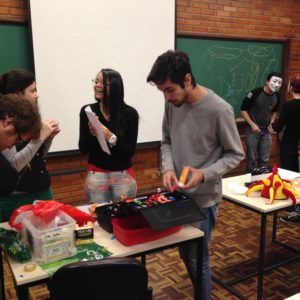
Designing oppressive and libertarian interactions with the conscious body
Gonzatto, R. F., & van Amstel, F. M. (2017, October). Designing oppressive and libertarian interactions with the conscious body. In Proceedings of the XVI Brazilian Symposium on Human Factors in Computing Systems (pp. 1-10). ACM, New York, NY, USA, Article 22, 10 pages. DOI: https://doi.org/10.1145/3160504.3160542 - Oct 31, 2017 -
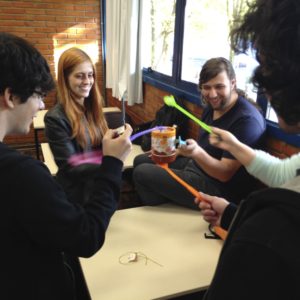
Interaction Design (a.k.a The Anthropophagic Studio)
Regular course – 80 hs – Digital Design Bachelor – Catholic University of Paraná (PUCPR) – Taught together with Rodrigo Gonzatto This course develops students’ creative and critical skills related to technology and society. Since the Digital Design Bachelor has already separate courses on Usability, Information Architecture, Ergonomics, and Interface Design, the Interaction Design course focuses […] - Aug 8, 2016 -
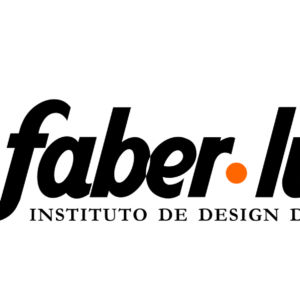
Faber-Ludens Interaction Design Institute (2007-2012)
Inspired by European Design schools that embraced the Digital Culture, like Ivrea Institute and its successor, Copenhagen Institute for Interaction Design (cIId), a multidisciplinary group founded Faber-Ludens Institute for Interaction Design in Curitiba, in 2007. As a non-profit organization, Faber-Ludens had a democratic (sometimes anarchic) governance model, which favored intense collaboration between its members and […] - Mar 26, 2007
